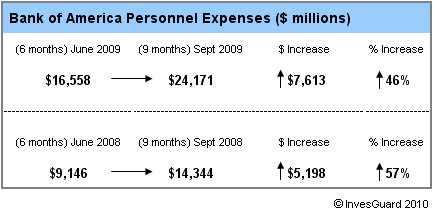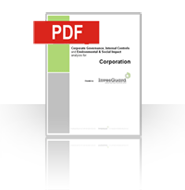January 14th, 2010
The focus this week has been on the big banks.
Wednesday was ‘bank bashing’ day over at the Financial Crisis Inquiry Commission. Unusually pertinent and pointed questions and as usual ambiguous, ‘beating around the bush’ answers characterized the session.
On another note, a WSJ article indicated a possible ‘one upmanship’ between Goldman and Morgan Stanley. Both banks tried to outdo each other and announce their earnings before the other. Apparently, there is some belief that the bank with the earliest earnings announcement ‘catches the worm’, interms of a stock price rally. Talk about being hyper competitive….
Anyway, so here at InvesGuard we have also been doing our little bit of bank scrutiny in terms of their compensation data. Over the past two posts, we looked at JP Morgan as well as Bank of America and today we will be reviewing the profile of Goldman Sachs.
Instead of writing reams and reams on Goldman’s compensation practices, I thought it would be better if I just present this data and leave the analysis to you. The data sort of speaks for itself.
Compensation for 9 months ended 2009: $ 16712 million
Compensation for 9 months ended 2008: $ 11424 million
Increase in 2009 over 2008? : Of course (its Goldman we’re talking about, remember?)
Percentage Increase in Compensation : 46%
Number of employees for 9 months ended 2009: 31700
Average Per employee compensation (2009): $ 527,000
Average Per employee compensation (2008): $ 303,800
Ration of Compensation and benefits to Net Revenues (9months 2009): 47%
Revenue Change (9 months Year over Year comparison)
Investment Banking Revenues: Significantly lower
Trading and Principal Investments: Significantly higher by 108%
Asset Management and Securities Services: Lower
So what do analysts say about Goldman?
Out of 26 analysts surveyed, only 9 (less than half) had a strong buy recommendation, 7 had a ‘hold’ and 10 analysts recommended a ‘buy’. (Source: First Call / Thomson Financial)
InvesGuard Score:
Over extended directors, board independence issues coupled with poor Social and Environmental disclosures give Goldman an average rating. Look it up here.
Come January 21, (Goldman’s Quarter 4 earnings release), it should be interesting to see whether all the donations, charitable giving and some press coverage is enough to counteract the negative public perception of its earnings.
please wait...
Rating: 5.0/5 (1 vote cast)
Tags: bankers pay, Goldman Sachs
Posted in Earnings, Goldman Sachs, Uncategorized, company | No Comments »
January 13th, 2010
In our bid to better prepare ourselves for the barrage of compensation related data that is sure to unfold soon, we have started reviewing 2009 compensation data for banks in the hopes that the final picture will not necessarily give us a stroke!
Yesterday, we covered JP Morgan Chase and today it is the turn of Bank of America.
For 9 months ended Sept 2009, personnel expense was $24,171 million, whereas for the same period in 2008 it stood at $14,344 million. This increase of $9,827 million is part of the total indirect expense increase and has been attributed to the acquisition of Merrill Lynch and Countrywide which increased various expense categories. But what is interesting to see is the rate of increase in personnel expenses in the 3rd quarter over the 2nd quarter is only slightly higher than the increase in the same period in 2008.

That said, the total increase in personnel expenses for 9 months ended 2008 to same period 2009 is close to 70%. This can imply that most of the increase attributable to the Merrill and Countrywide takeover happened in the first 1 or 2 quarters of 2009 and subsequently, lay-offs or other separation type events reduced the net increase as a result of the Merrill and Countrywide takeover. As a corollary of this, one can assume that fourth quarter personnel expenses will not be substantially different from the third quarter barring of course any bonus amounts and incentive related amounts paid out.
The bright spot of course is the relative lower percentage increase in personnel expenses in 2009 as compared to the same period in 2008.
Naturally, Bank of America cannot go mentioned without talking about Paymaster Kenneth Feinberg’s special ordinances for this company. In November 2009, Joe Price and Barbara Desoer (Chief Financial Officer and President, Bank of America Mortgage, Home Equity and Insurance Services) had their base salaries reduced with retroactive (November 2009) effect. As per the amendments, Joe Price had his salary reduced from $800k to $500k and was awarded $5.25 million in salary stock award units. Barbara Desoer had her salary reduced from $800k to $500k and was awarded $3.95 million in salary stock unit awards. Mind you, although they are called ‘stock units’, these salary ‘stock units’ are paid in cash, based on the Corporation’s stock price on each payment Date. The agreement stipulated that if repayment were to occur, (which did happen soon after this ordinance), all Salary Stock Units that would have become payable within the one-year period following this repayment date would be paid on the repayment date, and the Payment Dates for all remaining Salary Stock Units shall be accelerated by one year. It is not clear whether after repayment, salaries go back to original values or not, but we will soon know.
Then there was the matter of now ex CEO Kenneth Lewis’ salary and compensation. After oscillating between being the darling of Wall Street for orchestrating the Merrill takeover and being the scapegoat for the subsequent fiasco, Kenneth Lewis agreed to forgo his salary and bonus for 2009 and also negotiated a lower exit package.
From a governance standpoint, some good changes have taken place in BofA’s boardroom primarily, getting some good candidates onboard who have relevant experience and can take a fresh look at the company. In addition, naming a CEO was another step in the right direction and one can only hope that Massey and Co. will take a closer look at succession planning in the future.
please wait...
Rating: 0.0/5 (0 votes cast)
Tags: Bank of America, bankers pay
Posted in Bank of America, company | No Comments »






